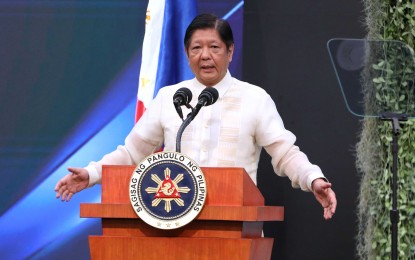
President Ferdinand R. Marcos Jr. (File photo)
MANILA – President Ferdinand R. Marcos Jr.’s advocacy to uphold rules-based international order has earned support from the member states of Group of Seven (G7) and Quadrilateral Security Dialogue (QUAD), Malacañang said on Friday.
The expression of support was relayed to Communications Secretary Cheloy Garafil by Japanese Ambassador to the Philippines Koshikawa Kazuhiko through a letter sent to her on May 20.
Garafil said the letter contains Koshikawa’s report on the outcome documents of the recently-concluded 2023 G7 and QUAD summits hosted by Japan.
Citing Koshikawa’s letter, Garafil said the twin summits resulted in the issuance of “consequential decisions encompassing matters related to the Philippines.”
“The outcome document of the recently-concluded 2023 Group of Seven and Quadrilateral Security Dialogue summits in Japan strongly supported President Ferdinand R. Marcos Jr. on his position to adhere to the international rules-based order and maintain peace and stability in the region,” she said.
Koshikawa informed Garafil that during the G7 summit, the leaders had reaffirmed their resolve to meet global challenges and further champion shared international principles and values.
To maintain a free and open Indo-Pacific, the G7 leaders had emphasized their commitment to strengthen coordination with regional partners, including the Association of Southeast Asian Nations (ASEAN), Koshikawa said.
ASEAN is eyeing an economic-cooperation thrust in the Indo-Pacific.
Under the concept, ASEAN seeks to deepen economic integration, ensure financial stability and resilience, and strengthen trade and investment by supporting the implementation of the ASEAN Economic Community Blueprint 2025 and other free trade agreements including the Regional Comprehensive Economic Partnership (RCEP).
Koshikawa, Garafil said, had also emphasized the G7 leaders’ stance that there is “no legal basis” for China’s expansive claims in the South China Sea (SCS).
Garafil said the G7 leaders had likewise expressed “strong” opposition to Beijing’s militarization in the SCS, stressing the universal character of the United Nations Convention on the Law of the Sea (UNCLOS) and its pivotal role in setting out the legal framework in all activities in the oceans and seas.
“Significantly, the leaders reiterated the legally binding Arbitral Tribunal award rendered on 12 July 2016 as a significant milestone as a basis for peaceful resolvement of disputes between the parties. Furthermore, they affirmed the importance of peace and stability across the Taiwan Strait, and agreed to foster resilience to economic coercion,” she said, based on the letter.
Meantime, Koshikawa told Garafil that the QUAD leaders, during the May 20 summit, had reaffirmed their vision of a “peaceful, prosperous and stable” region which respects sovereignty and is free from any form of intimidation and coercion.
“During the QUAD meeting, Japan’s foreign ministry said Prime Minister Fumio Kishida expressed serious concern about attempts to unilaterally change the status quo by force or coercion in the Indo-Pacific, including the East and South China Seas. QUAD leaders shared the view that they strongly oppose such attempts,” Koshikawa said.
Garafil said QUAD leaders had also affirmed their commitment to follow four principles, which include investing in the future prosperity of the Indo-Pacific and maintaining and strengthening stability in the region in accordance with international law and work to strengthen and reform the multilateral system.
“Other principles are respect for the centrality, agency and leadership of regional institutions while firmly working in and alongside each other, and transparently work together in open dialogue to deliver responsive and sustained economic and social value,” Koshikawa’s letter read.
“By working together in creating a brighter future for all, the decisive actions in the summits concretize steps towards upholding an international order based on the rule of law and strengthening outreach to the Global South,” it added.
The G7 is an informal bloc of industrialized democracies such as the United States, Canada, France, Germany, Italy, Japan and the United Kingdom (UK). It meets annually to discuss issues such as global economic governance, international security and energy policy.
On the other hand, the QUAD is a security dialogue between the US, Australia, India and Japan. All democracies and vibrant economies, member countries tackle security, economic and health issues. (PNA)
